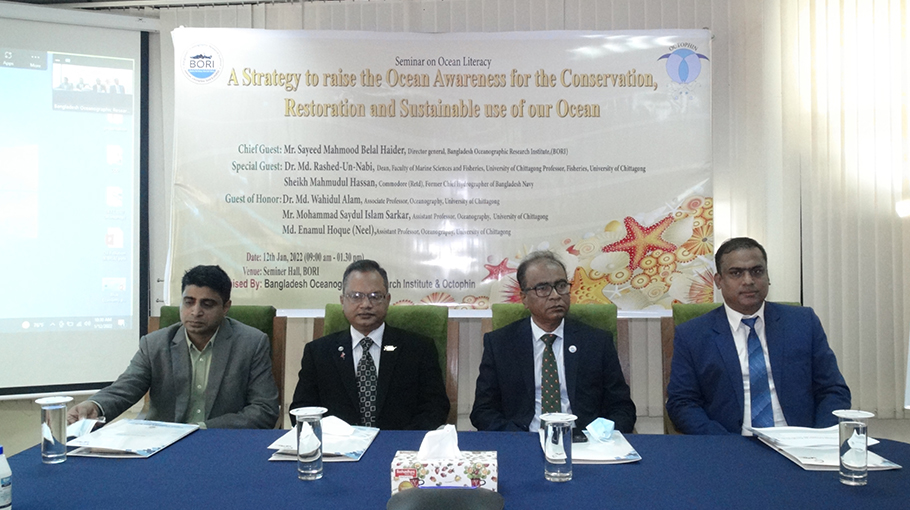‘ Textbooks should include oceanography to protect oceans’

The sea has no borders, so there is only one sea in the world. 95% of the mysteries of the sea have not been revealed yet. There are endless resources at the bottom of the sea. In order to protect the earth, the sea must first be kept free from pollution.
Scientists and experts made the remarks at a seminar on the importance of building a sea-literate nation for the protection, restructuring and sustainable use of the sea at the Bangladesh Marine Research Institute (BURI) auditorium.
Speakers at that discussion said that the world cannot be saved if the people of the world cannot sign the sea. The Bay of Bengal is a bigger continent than the land of Bangladesh. About half the people of the country depend on this sea. But due to various pollutants including plastics, the sea may become unusable in the next 30 to 50 years. We can save the sea by spreading knowledge about the sea among the people and building a sea literate nation. For this, the textbook should include topics related to the sea. As well as the use of disposable plastic in tourist areas should be stopped.
Scientists and experts at the seminar said that due to the lack of awareness of people about the sea, various types of pollution are increasing day by day, thus threatening the overall environment and the environment. Earth's temperature is rising day by day. At present no subject related to sea is taught in any text books at school level. Many are reluctant to accept the word sea pollution. But due to the ignorance, people are not able to ensure the proper use of such invaluable gift of the Creator.
Director General (Additional Secretary) of Bangladesh Marine Research Institute Saeed Mahmud Belal Haider was the chief guest at the seminar held on Thursday morning and the special guest was Professor Dr Bashedunnabi Rafi and Sheikh Mahmudul Hasan, Retired Chief Hydrographer of the Navy. Associate Professor of the Department of Oceanography, University of Chittagong, Dr WahidulAlam, Assistant Professor Md Saidul Islam Sarkar and Dr Enamul Haque. Also speaking were Abu Saeed Mohammad Sharif, Senior Scientific Officer, Department of Chemical Oceanography, Bangladesh Oceanography Research Institute, Mohammad Zakaria, Senior Scientific Officer, Department of Oceanography, Israt Jahan, Octila, Sanjila Sharmin and Hrishika Bara.
At the seminar, the scientists expressed concern over the recent rise of various harmful bacteria in the waters of the Bay of Bengal due to sea pollution and said that a proper action plan should be adopted to protect the sea. Scientists also suggested stopping the use of one-time plastic in tourist areas to stop marine pollution.
Abdul Qayyum, a marine scientist who is the manager of Nekam, said that turtles have not been coming to the coast of Cox's Bazar for the last two years due to environmental disasters.
Dr Wahidul Alam fears that the tourism industry could also be threatened due to increased microbial pollution or harmful bacterial contamination in the sea water.
According to the seminar, every person in the world needs to know about the sea. Without the initiative to protect seas from pollution, the blue economy opportunity will not be of any use. The sea must be saved to keep the earth in order to keep the atmosphere right.
The seminar said that the sea is a mountain of resources and everyone needs to be aware of the sea to protect this resource.
The day-long seminar was attended by members of Octofin and students of the Department of Oceanography as well as journalists from print and electronic media.




